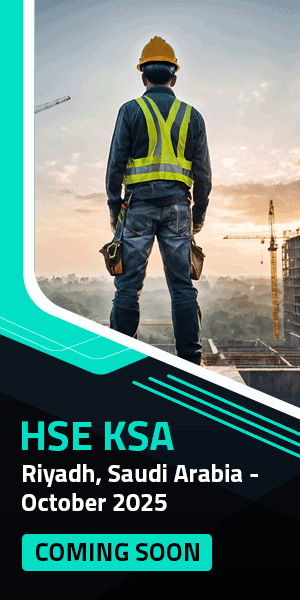Paul Burns, who heads corporate HSSE training at ACWA Power, pens a piece for Health, Safety and Environment Review Middle East. Read on:
There is a dual impact of HSE on people and businesses. At last year’s MENA HSE Forum, I emphasised the critical importance of Health, Safety, and Environment (HSE) practices in benefiting both individuals and businesses. Embedding comprehensive HSE strategies into an organisation's fabric is essential for transforming approaches to health and safety and enhancing business performance.
Robust HSE policies create a secure work environment for individuals, minimising risks and boosting well-being, job satisfaction, and productivity. Organisations also benefit from fewer disruptions, lower incident-related costs, reduced absenteeism, and enhanced reputation.
It is important to enhance organisational culture and compliance through safety knowledge. At ACWA Power, 2023 marked a significant shift in HSE strategy, transitioning from traditional injury metrics to an accountability-driven approach. This realignment, focusing on people-based safety and proactive management, has been fundamental in embedding an advanced culture of safety and responsibility.
Safety training also empowers our workforce to identify potential hazards and take proactive measures – supporting regulatory alignment and promoting adherence to safety standards. At ACWA Power, a well-informed workforce is a crucial part of our organisational culture, instilling responsibility and collective awareness and making each member feel valued and integral to the process.
The role of the Internet of Things (IoT) and automation in HSE
These values of responsibility and inclusion are now significantly enriched by the Internet of Things (IoT) and automation. These technologies are revolutionising HSE operations by enhancing data collection, analysis, and response capabilities. Digital devices enable real-time monitoring of environmental conditions and employee health, facilitating initiative-taking risk management.
Furthermore, automation technologies streamline safety processes, improve incident reporting accuracy, and minimise human error. ACWA Power's adoption of digital tools, including AI for data analysis, has set a new standard in data-driven safety management. Additionally, Third-Eye AI at key ACWA Power sites has enhanced real-time hazard identification and intervention capabilities and provided greater reassurance and security while showcasing the potential of technology in improving safety.
Despite our progress, the MENA region faces significant HSE challenges, including diverse regulatory frameworks across countries and the need for improved safety awareness and training across industries. Addressing these challenges requires collaboration between government bodies, organisations, industry groups, and thought leaders. As a leader in the field, we are proud to partner with external bodies to share our expertise as thought leaders in HSE.
ACWA Power’s outlook and the future of HSE
Our ability to lead by example was borne out in hard evidence in 2023 – with the company accumulating 72 million man-hours and reducing the lost-time injury rate to 0.01. This is 22% lower than in 2022, with no fatalities. This progress enabled crucial project milestones and implementation of the Reliability of Supply framework, boosting consolidated power availability from 87% to almost 92%.
Looking ahead, HSE will evolve as an operational imperative through the integration of disruptive technologies. Sustainability and resilience will become central to HSE strategies, with organisations adopting holistic approaches that integrate environmental stewardship with traditional safety measures.
The MENA HSE Forum provided a valuable platform for sharing insights, exploring developments in HSE practices, and networking with industry leaders. As a sponsor and speaker, ACWA Power demonstrated its commitment to advancing HSE practices across the region.
The MENA HSE Forum serves as a crucial platform for tackling HSE challenges and unlocking new opportunities. Through ongoing collaboration, investment in technology, and a focus on safety culture, we can drive meaningful progress and ensure a safer, more resilient future for all.










